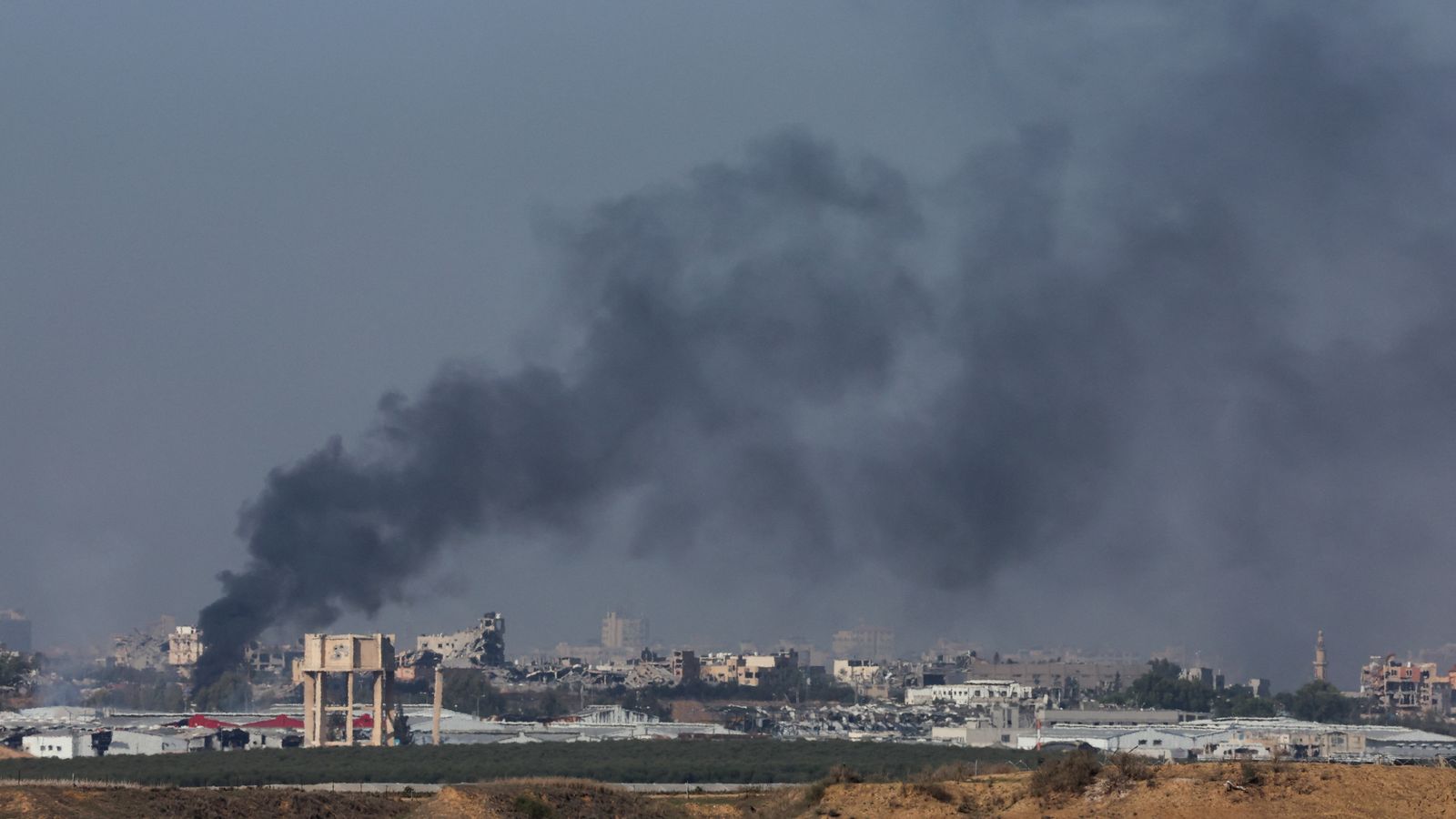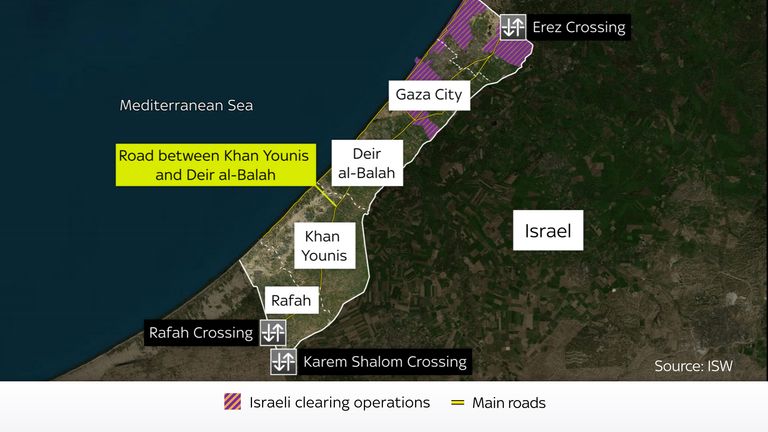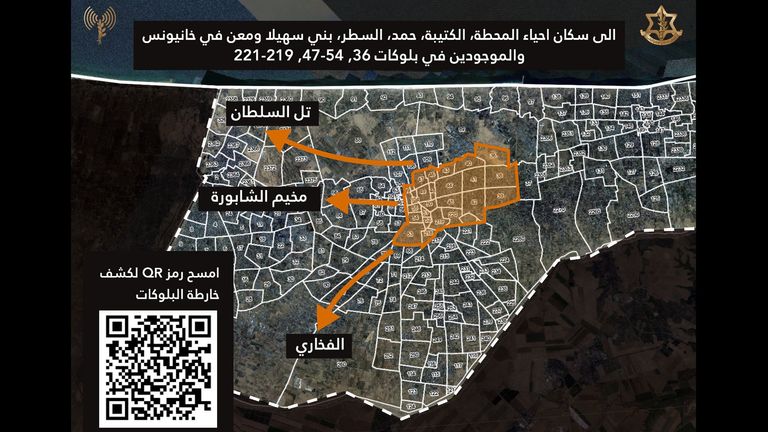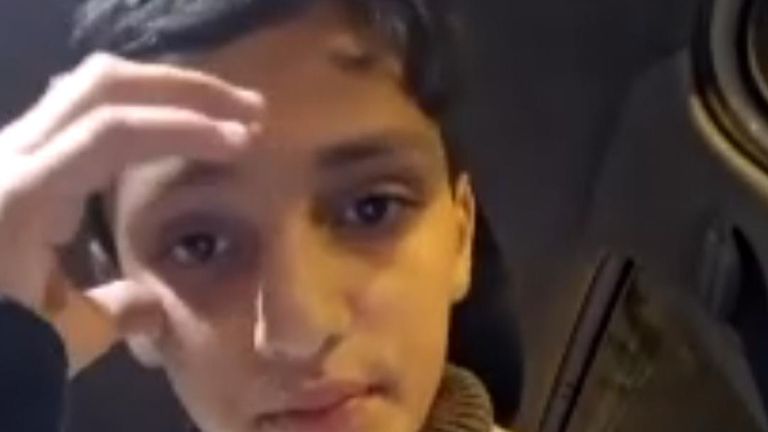The Israeli military has said its ground offensive is expanding to every part of Gaza as its campaign to oust Hamas continues.
Tanks have cut off the road between Khan Younis and Deir al-Balah in central Gaza, effectively dividing the Gaza Strip into three, the Reuters news agency reported on Monday.
Follow live: Military operations ‘almost complete’ in north of Gaza
It suggests Israel’s planned ground offensive in the enclave’s refugee-crowded south has begun.
People in Gaza had feared an Israeli ground offensive on southern areas was imminent.
Residents said they heard airstrikes and explosions in and around Khan Younis overnight and into Monday after the military dropped leaflets warning people to relocate further south towards the border with Egypt.
Israeli military spokesperson Rear Admiral Daniel Hagari told reporters in Tel Aviv: “The IDF (Israel Defence Forces) continues to extend its ground operation against Hamas centres in all of the Gaza Strip.”
James Elder, spokesperson for UNICEF, posted a voice note from Khan Younis on social media, saying it had been a night of “utterly relentless bombardments”. The sound of apparent strikes could be heard in the background.
“And of these bombardments, such is the tight knit pack of mums and children and families, that I can’t imagine how it would seem to me that everything that’s blasted off, I pretend no military expertise, but almost hit something… someone,” he said.
On Monday morning, the IDF issued new orders to people in around 20 areas of southern Gaza to evacuate.
It posted a map on X, formerly Twitter, with arrows pointing to areas civilians should head to.
Many people in and around Khan Younis in the south have come from the north, after an Israeli order to move south earlier in the conflict, and are having to move yet again.
The Gaza Strip has effectively become a battlefield from the north to the south, with Lebanon-based Hamas official Osama Hamdan saying: “There are no safe areas.”
Israel government spokesperson Eylon Levy said the military had struck more than 400 targets over the weekend “including extensive aerial attacks in the Khan Younis area” and had also killed Hamas militants and destroyed their infrastructure in Beit Lahiya in the north.
The ground offensive has transformed much of the north, including large parts of Gaza City, into a rubble-strewn wasteland.
Hundreds of thousands of people have sought refuge in the south, which could meet the same fate.
Click to subscribe to the Sky News Daily wherever you get your podcasts
The expanded offensive follows the collapse of a week-long ceasefire and is aimed at eliminating Gaza’s Hamas rulers, whose attack on Israel almost two months ago has triggered the deadliest Israeli-Palestinian violence in decades.
On 7 October, 1,200 Israelis were killed and 240 more were abducted and taken into Gaza as hostages. More than 75 have now been released as part of a now-expired ceasefire.
The Hamas-led Gaza health ministry says more than 15,000 Palestinians have been killed in Israeli attacks since 7 October – and says 70% of fatalities are women and children.
The war has also displaced more than three-quarters of the territory’s population of 2.3 million Palestinians, who are running out of safe places to go.
Read more:
US shoots down drones as ships caught in missile attack
Decomposing bodies of babies ‘seen in hospital footage’
UK to conduct surveillance flights to help find hostages
Under the Israeli plan to ensure people move as safely as possible, they have divided Gaza into numbered blocks, and people living there, in theory, will be told when to move before bombings begin.
Leaflets have also been dropped with a QR code linked to an interactive map with the numbered districts marked on it.
But UN officials and people in Gaza say it is difficult to heed these orders in real-time given patchy internet access and unreliable electricity.




